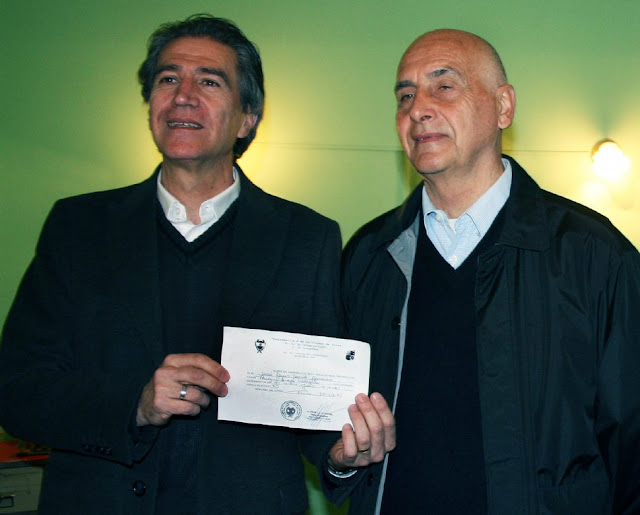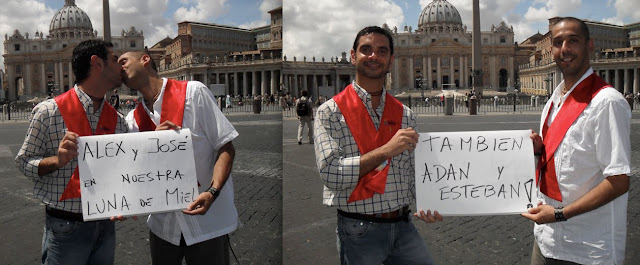Rosario, this afternoon: Martín Peretti Scioli y Oscar Marvich were among several couples who took to the courts over the last few years to ask for the right to get marriage. In their case, a court ruled against them in 2008 but this time they were back with two hundred of their closest friends in what was described as massive scene.
After the vows, the couple danced a waltz in front of their guests and cut a wedding cake. The above images were captured during the ceremony by Pablo Czentorycky, who tweeted them at @pablitocz. The video came my way later.
Santa Cruz, this morning: Claudia Baéz and Cristina Medina received their appointment for the civil court for 7:30 in the morning earlier today. The women became the first lesbians to marry since passage of the law as well as the first couple from the southern Argentinean region of Patagonia.
They had thought about holding a ceremony outdoors, possibly with the imposing beauty of the southernmost point's glaciers as background, but the quick turn around between the marriage license petition and the date for the wedding forced them to arrange a low-key affair. Jornada says the couples' witnesses included both of the brides' mothers, a close friend of Cristina's and Claudia's son.
The video above shows the absolute joyfulness of their vows and love for each other despite it's low resolution.
Mendoza, a little bit past midnight: Eight days ago, when Giorgio Nocentino and Jaime Zapata visited their local civil court and petitioned for a marriage license, little did they know that they would be granted what was then the first place in line to get married as a gay couple in the entire country. That date was today, July 31st, although no specific time was indicated at the time.
Briefly, for a few days, the couple became media darlings despite being a bit camera shy. In that respect, it didn't help that both
men were born in Chile and naturalized citizens of Argentina, which drew additional international media attention, including heavy coverage from the Chilean press. Initially they expressed shock at the attention and said they weren't seeking to be famous nor did they want to become activists. They said they simply loved each other but, most of all, they wanted to make sure that after 23 years of being together they could finally gain some security as partners.
As the week went along, though, you could see them warm up to being part of history and, when two couples beat them yesterday to the title of first couple to marry, you could sense their disappointment. Up until last night, before their wedding, they were still arguing that theirs was the first legal marriage between two people of the same sex (there has been a muted debate in media as to whether yesterday's weddings were, indeed, valid, as most had reported that couples could only start getting married today, on the 31st).
As you can tell by the video, most of that was forgotten and the ceremony was pure emotion. An employee of the court decided to surprise the men by singing a song before the vows were taken. The men look as if they cannot believe whet is happening as they make the vows and sign the civil marriage registry. And that brief shot of the two men overcome by emotion as they look over the crowd and the crowd just stands there and applauds is just amazing.
They also expressed being at peace with being first or second or third to marry. "To be first or second doesn't correspond to a particular preference," Zapata said, "we are just happy about this transcendental achievement".
Buenos Aires, yesterday, 9am: In some ways Alejandro Vanelli and Ernesto Larresse were the ones who began the marriage ball rolling when they requested a marriage licence from a civil court on June 13th, 2007, and were denied the right. By then, Buenos Aires was known as the one city in Latin America that had approved a limited civil union law but the couple wanted nothing less than marriage.
Alejandro, a renown showbiz talent manager, and Ernesto, an well-known actor didn't care if it hurt their careers. They joined efforts by the Argentinean LGBT Federation (FALGBT) to push for marriage equality at a time when many said it would be impossible and did, indeed, push forward. They even participated in several of the organizations marriage equality media campaign ads, including this one, and helped FALGBT to gain incredible support from respected actors, musicians and performers.
"What we liked the most was to begin, together, another one of the marvelous adventures we have had in our lives," Alejandro told La Nacion, "In this case, it was to work jointly with young people, without support, without lobby, common, simple folk, who sought equal rights."
So pardon them if the video of their marriage ceremony not only looks like a celebration of their love but also a media event or one big photo op: That was exactly the point.
The couple, guided by the FALGBT and its president Maria Rachid, knew the exact place and backdrop they wanted: The ceremony was held at the exact same civil court where the couple had been denied the right to marry three years ago.
It was also, to their knowledge, the first time a gay couple would be getting married after passage of the law - except...
Described as an unassuming and discrete couple, they didn't make a fuss about their marriage ceremony and only invited close friends and family. Only a few local newspaper reporters got wind of the wedding and captured pictures of the ceremony but no television cameras showed up. By the time word traveled that a gay couple had gotten married in Santiago de Estereo, some national and international media had already reported Vanelli and Lerresse as being the first couple to marry, including CNN International.
The couple does plan to take full advantage of a honeymoon trip paid by the Mexico City government which announced they would cover all costs for the first couple who got married in Argentina. Mexico City was the first municipality in Latin America to pass a marriage equality law last year and authorities wanted to offer a good-will gesture to unite that Mexican milestone with the Argentinean one.
Tierra del Fuego, December 29, 2009: And so, those above were the first five same-sex couples who got married in Argentina after President Cristina Fernandez de Kirchner signed the marriage equality bill into law. That does not mean that they were the first Argentinean couples to be allowed to marry.
As we have written previously, that honor will always remain with José Maria Di Bello and Alex Freyre (above) who also went to the courts to ask for permission to get married and were also denied. Except, with the help of the FALGBT, they appealed those decisions and ultimately got the go-ahead in November of 2009. As HIV prevention activists and HIV positive themselves, the couple made plans to marry on December 1st, World AIDS Day, as a symbolic act but they were thwarted when a Buenos Aires court put a stay on the nuptials.
It was through the FALGBT that the couple found a willing civil servant in the southernmost area of the Americas, Tierra del Fuego, when the couple shocked the world with the announcement that they had gotten married on December 29th, 2009.
Recently, the couple attended the World AIDS Conference in Vienna and, on their way back, they stopped in Italy where they celebrated their long-delayed honeymoon. Back in Buenos Aires as of this weekend, Alex spent some time this afternoon sending some "honeymoon photos" he took at the Vatican, some more profane and hilarious than others, including the "safe" ones I've chosen to post above and below. In the signs they are holding above, the text says "Alex and José in our honeymoon" in the first one and "Adam and Eve" on one side and "...also Adam and Steve!" on the other.
A sign in a third photo, posted below, reads "Latin America: The same rights with the same names/ The same love". Alex sent these through his Twitter account. He can be reached at @AlexFreyre .
The others: Like Alex and José Maria, there are another 9 or 10 couples who won the right to marry through the courts before the national marriage equality law was signed into law. Of those couples, most were able to find a court officer to marry them but most also faced court appeals which froze the status of their marriages. Alex insists that now that marriage equality is the law of the country, all those marriages are now valid but I haven't seen any media discussion about their validity. Then again, Alex was cool as a cucumber even as the marriage bill seemed doomed in the Senate just days before it voted and kept telling everyone who would listen that he was certain it would pass. And now he insists he is 100% officially and legally married to José Maria at this very moment. We'll take his word for it.
As for those words in the sign they are holding on that last photo, there is no way but to think back to that one amazing ad asking people to imagine what the day after the Senate vote - July 15th, 2010 - would be like if they approved the marriage equality bill...






.jpg)













.jpg)

.jpg)
.jpg)



















.jpg)